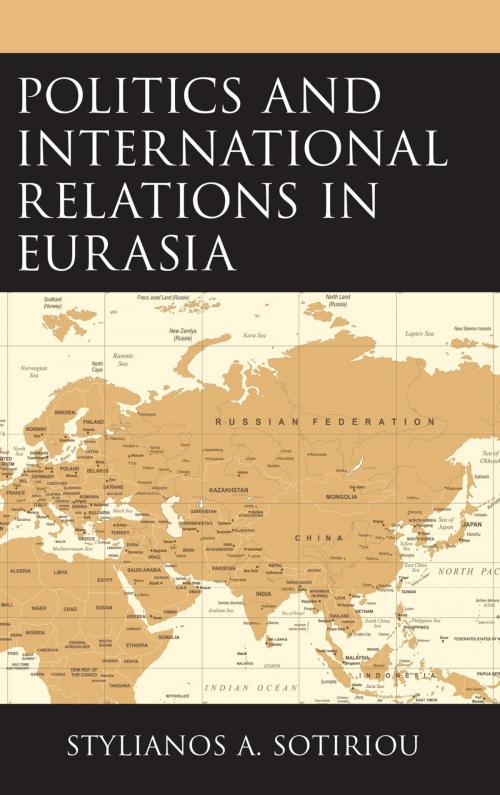Politics and International Relations in Eurasia
Nonfiction, Social & Cultural Studies, Political Science, International, International Relations| Author: | Stylianos A. Sotiriou | ISBN: | 9781498565394 |
| Publisher: | Lexington Books | Publication: | March 28, 2019 |
| Imprint: | Lexington Books | Language: | English |
| Author: | Stylianos A. Sotiriou |
| ISBN: | 9781498565394 |
| Publisher: | Lexington Books |
| Publication: | March 28, 2019 |
| Imprint: | Lexington Books |
| Language: | English |
Eurasia has long been characterized by intense competition among populations and among States. The collapse of the Soviet Union constituted a critical juncture in the region’s course, since informal and formal norms subsided, giving rise to a hardly regulated socio-political environment, where survival and security considerations ranked atop. In this context, populations, first and foremost, sought to have their existence guaranteed within nation-states. While in most cases that transition was accomplished without major impediments, in the cases of Moldova, Ukraine, Georgia, and Azerbaijan, major challenges have been encountered, leaving their mark deep in the post-soviet course of the newly independent republics. Moldova has been rattled by the conflict in Transdniestria, Ukraine by the conflict in Crimea, Georgia by the conflict in South Ossetia and Abkhazia, and Azerbaijan by the conflict in Nagorno-Karabakh. In fact, these conflicts have been classified as ‘frozen conflicts’, given their unsettled nature and the ‘smoldering fire’ between opposing populations within the respective republics.
This intense competition, however, has not been constrained only to the domestic level and only to the issue of ‘frozen conflicts’. Eurasia’s energy prospects have also been the cause of a constant power struggle among the States of the region. With the Caspian Sea to constitute a rich in natural resources hub, a clash of interests has taken place among the littoral States. Moreover, this competition has acquired a much broader geopolitical dimension, extending to Eurasia’s two ends, the European Union and China. As a result, Eurasia’s underbelly has become an area where the maximization of power figures as the best guarantee of survival and security in a fully unregulated environment.
Taken together, ‘frozen conflicts’ (domestic level) and ‘energy politics’ (international level) stand out as (the) two main features of Eurasia, both unfolding in comparable conditions. Therefore, the book presents them as a two-level game, aiming at offering better substantiated explanations that draw on the very fundamentals of political science, and at building a ‘bridge of communication’ between the two levels that allows for well-informed and widely applicable policy implications.
Eurasia has long been characterized by intense competition among populations and among States. The collapse of the Soviet Union constituted a critical juncture in the region’s course, since informal and formal norms subsided, giving rise to a hardly regulated socio-political environment, where survival and security considerations ranked atop. In this context, populations, first and foremost, sought to have their existence guaranteed within nation-states. While in most cases that transition was accomplished without major impediments, in the cases of Moldova, Ukraine, Georgia, and Azerbaijan, major challenges have been encountered, leaving their mark deep in the post-soviet course of the newly independent republics. Moldova has been rattled by the conflict in Transdniestria, Ukraine by the conflict in Crimea, Georgia by the conflict in South Ossetia and Abkhazia, and Azerbaijan by the conflict in Nagorno-Karabakh. In fact, these conflicts have been classified as ‘frozen conflicts’, given their unsettled nature and the ‘smoldering fire’ between opposing populations within the respective republics.
This intense competition, however, has not been constrained only to the domestic level and only to the issue of ‘frozen conflicts’. Eurasia’s energy prospects have also been the cause of a constant power struggle among the States of the region. With the Caspian Sea to constitute a rich in natural resources hub, a clash of interests has taken place among the littoral States. Moreover, this competition has acquired a much broader geopolitical dimension, extending to Eurasia’s two ends, the European Union and China. As a result, Eurasia’s underbelly has become an area where the maximization of power figures as the best guarantee of survival and security in a fully unregulated environment.
Taken together, ‘frozen conflicts’ (domestic level) and ‘energy politics’ (international level) stand out as (the) two main features of Eurasia, both unfolding in comparable conditions. Therefore, the book presents them as a two-level game, aiming at offering better substantiated explanations that draw on the very fundamentals of political science, and at building a ‘bridge of communication’ between the two levels that allows for well-informed and widely applicable policy implications.















